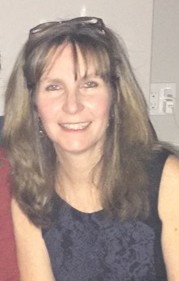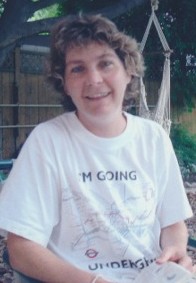
10 Years Cushing’s Free!
My name is Claire. I live in Ottawa, Canada, which is in the beautiful province of Ontario. I am foremost a mom to two absolutely wonderful children. I am also a grade one teacher. I have been living Cushing’s free for 10 years now and I want to share my story of hope with you.
In 2004, at the age of forty-two, I was diagnosed with Cushing’s disease. Like most of you, I had not been feeling well for at least a year, suffering from several different ailments. I was and still am, very fortunate to have an excellent family doctor whom I had known at the time for fifteen years. Dr. Judy Chow recognized my bloated face as a Cushing’s symptom and ordered the necessary tests. I was extremely fortunate to have such a knowledgeable physician. As you all know, it often takes many years to be properly diagnosed with this disease and by that time, patients have usually become very sick. My first endocrinologist did not support my doctor’s diagnosis because she thought that I was not overweight enough and not sick enough for Cushing’s.

1 month before diagnosis
Nevertheless, in January 2005 I had a transsphenoidal removal of a microadenoma in the pituitary gland performed by Dr. Gérard Mohr at the Jewish General Hospital in Montreal. The surgery was a success and I recovered well. I had been off from work for the entire school year and I was very happy to get back to my school life the following September.
That was the short story. The long story is that this disease took over my life and affected me as well as my family. This disease brought me great pain both physically and emotionally. Unbeknownst to me at the time, I was also suffering from fibromyalgia, which was brought on by the Cushing’s. Besides the physical pain, I was also suffering from anxiety, which I had never experienced before. It felt like I was falling apart.
Support
I was able to get through it all thanks to the amazing support I received from my family, my friends and my colleagues. My husband at the time was at my side every step of the way. He took care of me and kept up with all the medical information and accompanied me to all the important medical appointments. My children who were thirteen and fifteen at the time, were kept informed of all the medical steps and also took good care of me. They contributed by doing what they were expected to do which was work hard at school and be responsible at home. They answered the phone, screened my calls, prepared my warm baths, described their days and read to me. Throughout, I shared my feelings with them and that’s how we were all able to stay close and cope with everything that was happening to us. My parents, who lived in Montreal, called me twice a day and my brother, whom I had always been close to, showed me that there are no bounds to brotherly love.
The right health care system
I am very lucky to be Canadian and to benefit from what I think is one of the world’s best health care systems. I did not have to worry about medical bills and I was sent to a larger city to be operated on by an excellent neurosurgeon who had quite a bit of experience with my type of surgery. For all that, I am very thankful.
Be an advocate
As well, I was fortunate to have the strength to fight for my life. I became very knowledgeable of my disease (thanks to the Internet – how did people cope before this?); I kept detailed notes of all procedures, every test and all medications. I kept copies of all emails. I was friendly with all medical staff; I asked many questions, and I pushed and fussed (never being disrespectful) when I thought that things weren’t moving fast enough or when I wasn’t receiving the care that I deserved. Because of all of this, I was able to undergo surgery only three months after my diagnosis and I was able to recover in a relatively short amount of time. I taught my children how to be strong and how to become advocates for one’s self as well as for others. Dr. Chow once said with a bit of exasperation: “Claire, you have left no stone unturned.” I took that as a compliment, although I realized that I was being a pain.
Reach out
The other thing that helped me survive and get through my Cushing’s life was to reach out. Talk to your close ones about how you feel, share your concerns and your fears. Ask for help when you need it. Keeping a journal is also a good idea. I had read that it was a good idea to seek professional help especially after the surgery. When I talked to my husband about this, he said that I should do that if I wanted to but that he still wanted me to tell him everything. Ultimately, I decided that he was all I needed to get through this. However, not everyone is lucky enough to have that support.
One expects that after your operation everything will be better but in fact it’s not. After the operation, you are suffering first of all from the serious pain related to the surgery itself and then you have to deal with the pain related to the withdrawal from the high levels of cortisol. Your family may very well be amazingly supportive but they are not able to understand your pain. That is why it is extremely important to belong to a support group. I was very lucky to find CSRF and to be able to directly email Louise Pace and Karen Campbell, and other members. Among many things, this is where I learned to get the courage to get back out there in the world and to get on with my life. Although you would rather stay closed up from the world around you because making a phone call or going out to your children’s school causes incomprehensible anxiety, you must step back out. Face the world and you will get your life back.
Exercise
I literally walked through my six-month withdrawal period. I needed to move to manage the pain so I walked twice a day. I walked through the cold Canadian winter and when it was too icy, I walked with the retired folks in the shopping malls. I walked during the beautiful Ontario spring and every day, I felt a little bit better and a little bit stronger. It was also a great way to lose all those extra Cushing’s pounds. I also went to Tai Chi and yoga classes.
Keep pushing
The road to recovery can be a long one but you must always keep working at it. As I recovered emotionally and physically, I looked for alternative treatments or new ways of life. I sought the advice of a naturopath. Some people turn to meditation and others to acupuncture. Keep looking for that something that is just right for you.
Discovering new strengths
You will discover new strengths that you did not have pre-Cushing’s, because truly, “What doesn’t kill you makes you stronger”. However long it takes you, you WILL get through this and when you get to the other side, you will be able to get through anything after this. You will be able to help friends and family get through their own ordeals. You will also have developed increased empathy because you know all about physical pain; you know all about emotional stress and what it’s like to lose yourself; you know what it feels like to have to leave your job, to part with your favorite activities and to see the planet continue to turn without you. You will now be able to understand the pain of others and you will be able to support them and every time you do this, you will become stronger.
My new life
I have now been living Cushing’s free for ten years. My endocrinologist tells me that this is a good place to be. Although my Cushing’s life seems so far away, it also seems like it was just yesterday. It will always be there because it is part of me but at the same time, I have a new life now and your happiness is what you make it out to be. We are all survivors – or just about to be- and we are strong and we are alive and well.
Sending lots of hugs from Canada and please write to me if you need me.
Member number: 080143
Newsletter: Winter, 2015
Location: Ontario, Canada



